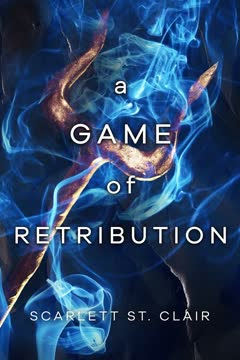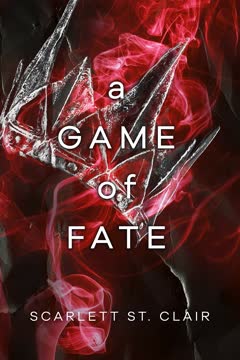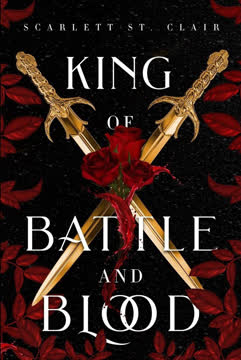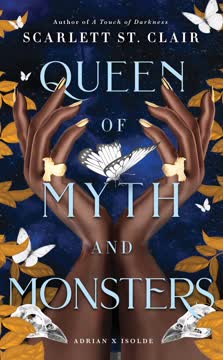Plot Summary
Shadows at the Racetrack
Hades, God of the Dead, arrives at the Hellene Racetrack, not for the thrill of the divine horse race, but to test the legitimacy of a mortal oracle, Acacius. Suspicious of Acacius's sudden omniscience, Hades suspects the use of a stolen relic. Amidst the crowd, Hades's public relationship with Persephone, the Goddess of Spring, draws attention and danger. Kal Stavros, a powerful Magi and media mogul, attempts to blackmail Hades, threatening Persephone's safety and privacy. The encounter sets the tone for the story: Hades's love for Persephone is both his greatest strength and vulnerability, and the world is watching, ready to exploit any weakness. The chapter establishes the tension between public scrutiny, divine politics, and the personal stakes of love in a world where gods and mortals collide.
Hera's Deadly Bargain
In the aftermath of the racetrack, Hades is confronted by Hera, Queen of the Gods, who seeks his support in overthrowing Zeus. When Hades refuses, Hera retaliates by cursing his future with Persephone, threatening to block their marriage unless he completes twelve impossible labors. The first: kill Briareus, an ancient ally. Hades is torn between his love for Persephone and the moral cost of Hera's demands. The goddess's manipulation exposes the brutal games of the gods, where love is a pawn and power is won through cruelty. Hades's internal struggle is palpable—he must choose between his principles and his heart, knowing that any misstep could doom his chance at happiness with Persephone.
Lovers and Labors
As Hades grapples with Hera's impossible task, he seeks solace in Persephone's arms. Their relationship is passionate, fraught with vulnerability and doubt. Persephone questions whether Hades's love is fated or freely chosen, and Hades, addicted to her presence, struggles to reassure her. Their connection is both a refuge and a source of pain, as the looming threat of Hera's labors and the scrutiny of the mortal world threaten to tear them apart. The chapter explores the tension between destiny and choice, and the ways love can both heal and expose old wounds.
The False Oracle
Hades, with Hecate's help, investigates Acacius, the mortal oracle. They discover he possesses the eye of the Graeae, a powerful relic that grants visions of the future. Hades's interrogation is ruthless, exposing the underbelly of New Athens's criminal world. The eye's true value is revealed: it is a weapon in the brewing war between gods and mortals. Hades's actions set off a chain of events that will have dire consequences, as the relic's power attracts the attention of other gods and ambitious mortals alike. The chapter underscores the dangers of prophecy and the high price of knowledge in a world ruled by fate.
Power, Secrets, and Betrayal
Hades's past returns to haunt him when Leuce, a former lover he once turned into a tree for betrayal, is restored to life. Her reappearance, orchestrated by unknown hands, threatens to destabilize his relationship with Persephone. Meanwhile, Hades's efforts to protect Persephone from the dangers of his world are undermined by secrets and half-truths. The gods' machinations grow more complex, and Hades is forced to confront the limits of his power and the cost of his choices. The chapter explores the corrosive effects of secrecy and the ways the past can poison the present.
The Return of Leuce
Leuce's return is a catalyst for jealousy, insecurity, and confrontation. Persephone, hurt by Hades's secrecy, demands honesty and transparency. Their argument exposes deep fears—of abandonment, of not being enough, of the inescapable weight of the gods' games. Hades's guilt over his past actions and his inability to protect Persephone from pain threaten to unravel their bond. The chapter is a crucible for their relationship, forcing both to confront uncomfortable truths and the necessity of forgiveness.
The Twelve Labors Begin
Under Hera's watchful eye, Hades embarks on the first of his twelve labors: the murder of Briareus. The task is a moral agony, as Briareus is an old friend and ally. Hades's visit to the Fates reveals the terrible cost of interfering with destiny—a soul for a soul, and no path that leaves Persephone unbroken. The labor is not just a test of strength, but of character and resolve. Hades's actions ripple outward, setting the stage for greater conflict and tragedy. The chapter is a meditation on sacrifice, duty, and the price of love in a world where the gods are both rulers and prisoners of fate.
The Hydra's Arena
Hera's next labor is a public spectacle: Hades must fight the hydra and other deadly creatures in her underground arena. The battles are brutal, testing not just his strength but his will to survive. The crowd, including his enemies and potential allies, watches as Hades is pushed to his limits. The violence is both literal and symbolic—a reflection of the internal wars he fights for Persephone's sake. The chapter is a turning point, as Hades realizes the true nature of Hera's game and the lengths he must go to protect his future.
The Graeae's Fate
The Graeae, ancient seers and keepers of prophecy, are found murdered with hydra venom. Their deaths, orchestrated by Hera and her mortal allies, mark a new era: the gods are no longer invincible. Hades and Dionysus realize that the balance of power is shifting, and that war between gods and mortals is inevitable. The murder of the Graeae is both a warning and a call to arms, forcing Hades to choose his allies and prepare for the coming storm. The chapter is a chilling reminder that even the immortal can be brought low by ambition and betrayal.
The Price of Immortality
Hades's labor—the murder of Briareus—unleashes unforeseen repercussions. The Fates demand a soul for a soul, and the cost is the resurrection of the ophiotaurus, a monster whose death could grant mortals the power to destroy the gods. Hades's attempts to protect Persephone and secure their future are undermined by the inexorable logic of fate. The chapter explores the limits of divine power, the dangers of hubris, and the tragic irony that the gods, in trying to control destiny, often become its victims.
Persephone's Grief
Persephone's desperation leads her to bargain with Apollo, violating the laws of the Underworld and incurring Hades's wrath. Their relationship is tested by grief, guilt, and the impossibility of saving those they love. The chapter is a raw exploration of mourning, the limits of divine intervention, and the ways love can both wound and heal. Hades and Persephone must learn to forgive each other and themselves, or risk losing everything.
The Forest of Despair
Manipulated by Leuce and Demeter, Persephone is lured into the Forest of Despair, where she is tormented by visions of Hades's betrayal. Her anguish unleashes a cataclysmic surge of magic, threatening to destroy the Underworld. Hades and Hecate intervene, helping Persephone distinguish illusion from reality and regain control. The ordeal is transformative, forcing Persephone to confront her insecurities and claim her power. The chapter is a crucible of pain and rebirth, marking Persephone's emergence as a true queen and equal to Hades.
Demeter's Last Stand
Demeter, desperate to reclaim control over Persephone, is summoned to the Underworld. Persephone, now fully in command of her magic and authority, confronts her mother and demands an apology for her manipulations and cruelty. Demeter refuses, and Persephone severs their bond, choosing her own path and family. The confrontation is both painful and liberating, as Persephone claims her autonomy and Hades stands by her side. The chapter is a powerful statement on breaking cycles of abuse and the courage required to choose oneself.
The Proposal
In the aftermath of grief and conflict, Hades and Persephone find solace in each other. Hades, having secured Hera's blessing through blackmail, proposes to Persephone in a moment of vulnerability and hope. She accepts, and their engagement is celebrated amidst friends and allies. The chapter is a hard-won victory, a testament to the resilience of love in the face of divine machinations and mortal suffering. Yet, even as they rejoice, the threat of war looms, and the future remains uncertain.
The Start of War
As Hades and Persephone celebrate their engagement, news arrives that the ophiotaurus has been resurrected, and snow falls over New Athens in the height of summer—a sign of Demeter's wrath. The gods' enemies, led by Theseus and Triad, are gathering their forces, armed with weapons capable of killing immortals. The balance of power has shifted, and the world stands on the brink of war. Hades and Persephone, united at last, must prepare to defend their love and their realm against enemies both mortal and divine. The chapter ends with the promise of chaos, sacrifice, and the ultimate test of their bond.
Characters
Hades
Hades is the brooding, powerful ruler of the Underworld, defined by his deep sense of responsibility and his consuming love for Persephone. His psychological complexity is rooted in centuries of isolation, guilt, and the burden of judgment. Hades's relationship with Persephone is both his salvation and his greatest vulnerability, exposing him to pain, jealousy, and the fear of loss. Throughout the story, he is forced to confront the limits of his power, the consequences of his bargains, and the necessity of trust and forgiveness. Hades's arc is one of growth—from a god who controls and punishes to a partner who learns to share, communicate, and accept his own fallibility.
Persephone
Persephone is a young goddess struggling to define herself in a world that seeks to control her—by her mother, by fate, and by the expectations of others. Her journey is one of self-discovery, as she learns to wield her magic, assert her independence, and claim her place as Hades's equal. Persephone's compassion is both her strength and her weakness, leading her to make dangerous bargains and risk everything for those she loves. Her relationship with Hades is a crucible for her growth, forcing her to confront her fears, insecurities, and the legacy of her mother's abuse. By the end, Persephone emerges as a true queen—powerful, compassionate, and unafraid to choose her own destiny.
Hera
Hera is a formidable antagonist, driven by resentment, ambition, and a desire for control. Her psychological complexity lies in her dual role as victim and perpetrator—wronged by Zeus's infidelity, she seeks retribution through cruelty and manipulation. Hera's labors for Hades are both a test and a punishment, designed to break his spirit and assert her dominance. Her alliance with mortal revolutionaries signals a new era of divine vulnerability, and her willingness to sacrifice anything for power makes her a dangerous foe. Hera embodies the destructive potential of pride and the corrosive effects of unchecked ambition.
Leuce
Leuce is a tragic figure, once Hades's lover and now a tool in the schemes of Demeter and Hera. Her return forces Hades and Persephone to confront issues of trust, jealousy, and forgiveness. Leuce's actions are driven by fear and manipulation, and her presence is a constant reminder of the past's power to disrupt the present. Ultimately, she is a victim of the gods' cruelty, seeking redemption and a place in a world that has moved on without her.
Kal Stavros
Kal is a dangerous mortal who wields power through information, manipulation, and dark magic. His attempts to exploit Hades and Persephone's relationship for personal gain highlight the vulnerability of the gods in a modern world. Kal's actions set off a chain of events that threaten Persephone's safety and force Hades to confront the limits of his ability to protect those he loves.
Ilias
Ilias is a steadfast ally, providing counsel, surveillance, and support throughout Hades's trials. His pragmatic approach and dry humor offer a counterbalance to Hades's intensity. Ilias's loyalty is unwavering, and his actions often serve as the glue that holds Hades's world together in times of crisis.
Hecate
Hecate is Hades's closest friend and advisor, offering guidance, tough love, and magical support. Her deep understanding of both the mortal and divine worlds makes her an invaluable ally. Hecate's interventions are often the catalyst for healing and growth, pushing Hades and Persephone to confront their fears and embrace their power.
Dionysus
Dionysus is a complex figure, straddling the line between hedonism and responsibility. His network of maenads and his involvement in the underworld's criminal activities make him both a potential friend and a dangerous rival. Dionysus's reluctance to choose sides in the coming war reflects the uncertainty and shifting alliances of the divine world.
Theseus
Theseus is a charismatic and ruthless leader of Triad, the mortal organization seeking to overthrow the gods. His alliance with Hera and his willingness to use violence and manipulation make him a formidable adversary. Theseus embodies the new era of mortal ambition, where the divine are no longer untouchable.
Lexa
Lexa's injury and eventual death are the emotional heart of the story, forcing Persephone to confront the limits of her power and the inevitability of loss. Lexa's journey from life to Elysium is a meditation on grief, healing, and the enduring bonds of love. Her fate is a catalyst for Persephone's transformation and a reminder of the high cost of divine intervention.
Plot Devices
Dual Narrative Perspective
The novel is structured as a first-person narrative from Hades's perspective, offering intimate access to his thoughts, emotions, and motivations. This device allows readers to experience the story's events through the lens of a god who is both powerful and deeply human in his fears and desires. The narrative's focus on Hades's internal struggles—his doubts, guilt, and longing—creates a sense of immediacy and emotional resonance, making the mythic feel personal and relatable.
The Twelve Labors as Modern Trials
Hera's imposition of twelve labors on Hades is a direct reference to the myth of Heracles, but here the tasks are not just feats of strength—they are moral dilemmas, tests of loyalty, and opportunities for growth. Each labor forces Hades to confront a different aspect of his character and his relationship with Persephone, blending action with introspection. The labors serve as both plot engine and thematic framework, driving the story forward while exploring questions of sacrifice, justice, and the nature of love.
Foreshadowing and Prophecy
The use of the Graeae's eye and other prophetic devices creates a sense of looming catastrophe. Hades's glimpses of possible futures—Persephone in the arms of another, the resurrection of the ophiotaurus—build tension and underscore the story's central theme: the struggle to change or escape fate. Foreshadowing is woven throughout, with small details and warnings accumulating until the final, inevitable confrontation.
Interweaving of Myth and Modernity
The novel reimagines Greek mythology in a modern setting, blending divine politics with media scandals, criminal empires, and mortal technology. This juxtaposition highlights the timelessness of the gods' struggles—love, power, betrayal—while grounding them in relatable, contemporary concerns. The interplay between mythic and modern elements enriches the narrative, making the stakes feel both epic and immediate.
Psychological Realism and Emotional Arc
The story's true engine is the emotional journey of Hades and Persephone. Their relationship is tested by external threats and internal doubts, with each crisis forcing them to confront their deepest fears and desires. The use of psychological realism—detailed explorations of grief, jealousy, guilt, and forgiveness—gives the narrative its power, transforming myth into a story of healing, growth, and the hard-won triumph of love.
Analysis
Scarlett St. Clair's A Game of Retribution is a modern myth that explores the intersection of love, power, and fate through the lens of Hades and Persephone's tumultuous relationship. The novel reimagines ancient Greek mythology for a contemporary audience, using the gods' struggles as a metaphor for the challenges of intimacy, autonomy, and healing in a world shaped by trauma and expectation. At its core, the book is a meditation on the price of love—the sacrifices required, the wounds it exposes, and the courage needed to choose it again and again in the face of loss and uncertainty. St. Clair's narrative structure, blending action with psychological depth, invites readers to empathize with gods as flawed, yearning beings. The story's central lesson is that true partnership is forged not in the absence of pain, but through the willingness to confront it together, to forgive, and to grow. In a world where even immortals are vulnerable, the greatest act of defiance is to love without reservation, to claim one's destiny, and to fight for a future built on trust, honesty, and mutual respect.
Last updated:
Review Summary
A Game of Retribution received mixed reviews, with an average rating of 3.99 out of 5. Many readers enjoyed the deeper exploration of Hades' character and the expanded mythology, praising the book's steamy scenes and engaging plot. However, some criticized the lack of communication between Hades and Persephone, finding their relationship frustrating at times. The book was generally considered an improvement over its predecessor, with readers appreciating the additional context provided by Hades' perspective. Some felt the story lacked depth or rehashed previous events, while others were captivated by the world-building and character development.
Hades x Persephone Reading Order Series
Similar Books
Download PDF
Download EPUB
.epub digital book format is ideal for reading ebooks on phones, tablets, and e-readers.
























